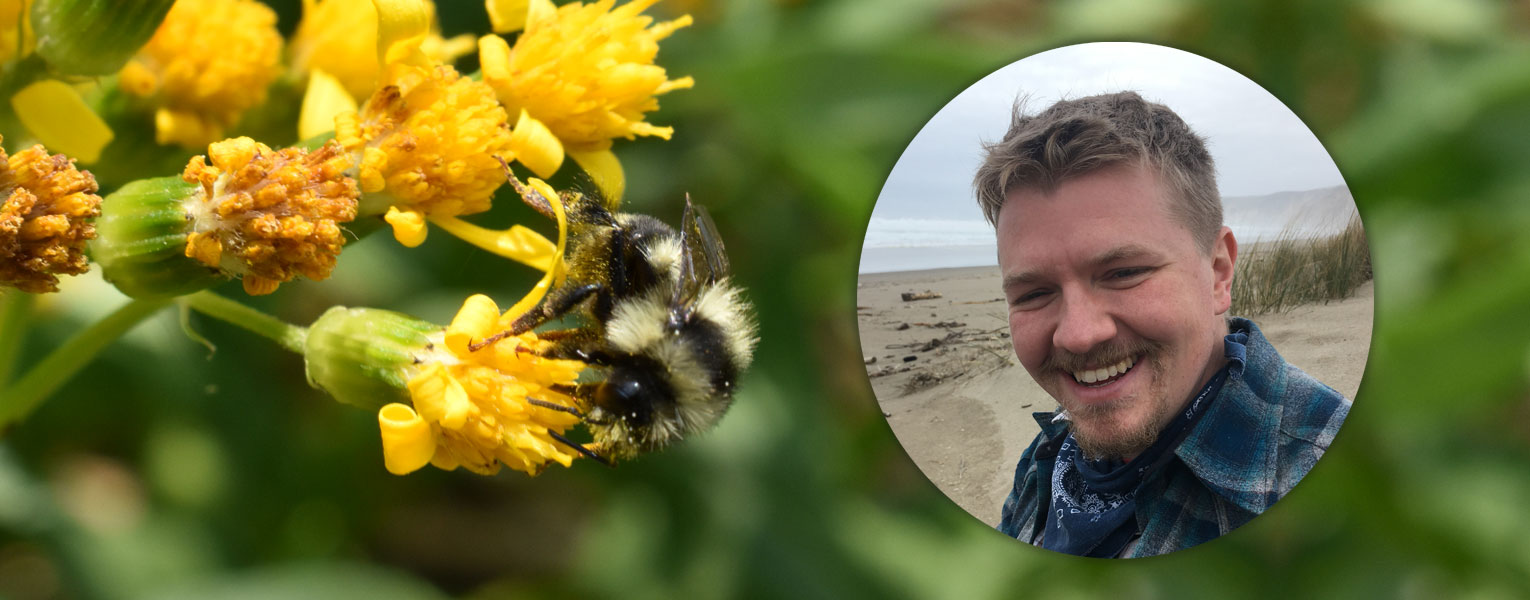2/12/2024
Faculty Spotlight: Jacob Francis, Ph.D.
Understanding the Microscopic World Inside Nectar
By Bethany Augliere
One out of every few bites of food, including fruits, vegetables, chocolate, coffee, nuts, and spices, is created with the help of pollinators, like bees who pick up the pollen and spread it from plant to plant, allowing plants to produce.
Without pollinators, some of your favorite foods may not exist, in fact, the world's food supply and our health, would be in jeopardy.
Francis, a new assistant professor in the Charles E. Schmidt College of Science, studies the microbe community in plant’s nectar, called the microbiome, which plays a role in pollination and the spread of plant diseases too, he said.
Fire blight, for example, is a disease that impacts apple production. It is moved around by bees and is part of the floral microbiome. “In addition to non-native honeybees, there are over 4,000 species of native bees in the U.S., some of which scientists think are in decline from disease spillover from agriculturally managed bee species,” Francis said. For that reason, we need to “understand the processes that shape how these microbes get around and how they influence pollinator decisions.”
“What’s cool about these microbes is that when flowers open, the nectar in particular has very few microbes in it, and so it's like a race,” Francis said. Those microbes, primarily bacteria and yeast, are racing to the nectar to digest the sugar, reproduce and get picked up by a pollinator to get moved to the next flower, grow as fast as they can, and get picked up to visit the next flower, he added.
Prior to Florida Atlantic, Francis was a National Science Foundation postdoctoral fellow in the department of entomology and nematology at the University of California, Davis. As a postdoc, he examined how variation in nectar chemistry of California fuchsia plants impacts bacteria and yeast communities. He completed his doctoral degree in the ecology evolution and conservation biology program at the University of Nevada. He earned a bachelor’s degree in biology from the University of North Carolina at Asheville.
Now at Florida Atlantic, he’s excited to begin working with native species in South Florida. “This is just a really excellent place to study the natural world and how humans are impacting it,” he said. Additionally, Florida is a unique place with endemic species that can exist nowhere else. And while many scientists want to study broad concepts and grand patterns, so we can say something like “this is how bees and plants interact across ecosystems so I can predict how ecosystems will function,” Francis said, “there’s also value in studying these weird, endemic, things that only occur on the Lake Wales Ridge, for example, or things that only occur on sand dunes in South Florida. That kind of endemism is interesting and is what makes the world a beautiful place to be.”
But Francis wasn’t always sure he wanted to be a professional biologist, and thought he wanted to be a high school biology teacher. “Truthfully, I floundered around a lot even though I knew I loved flowers from pretty early on.” So, for students interested in science and wanting to be a scientist, he wants to impart that it’s okay if you don’t know exactly what you want to do from a young age. You don’t have to have loved science as a kid in order to be a scientist, even though we hear that so often, he said.
Francis himself first got interested in plants during a botany class in the southern Appalachians as an undergraduate student. “The southern Appalachians are a botanical hotspot, they're a really wonderful place to be a botanist. And there's some cool plants there,” he said. In flowering plants, grasses and grains, collectively called monocots, they have parts in threes. But, in one spot in this region of the mountain one population of Trillium has parts in fours. His teacher mentioned this was because of pollination and seed dispersal, related to a lack of gene flow. That first sparked his interest in pollination biology, he said.
After earning his bachelor’s, he took off a few years to work at a nature center and teach people about the local plants. But as he read scientific publications to learn and write about wildflowers in the spring, and spent time observing them in the field, he realized he wanted to go back and do his own research on pollination biology.
“I enjoy the slower pace of studying plants,” he said. “You mostly know where they are going to be. You can find them, and they'll be there the next day. You can sit and really look carefully at them, which I love.”
If you would like more information, please contact us at dorcommunications@fau.edu.
